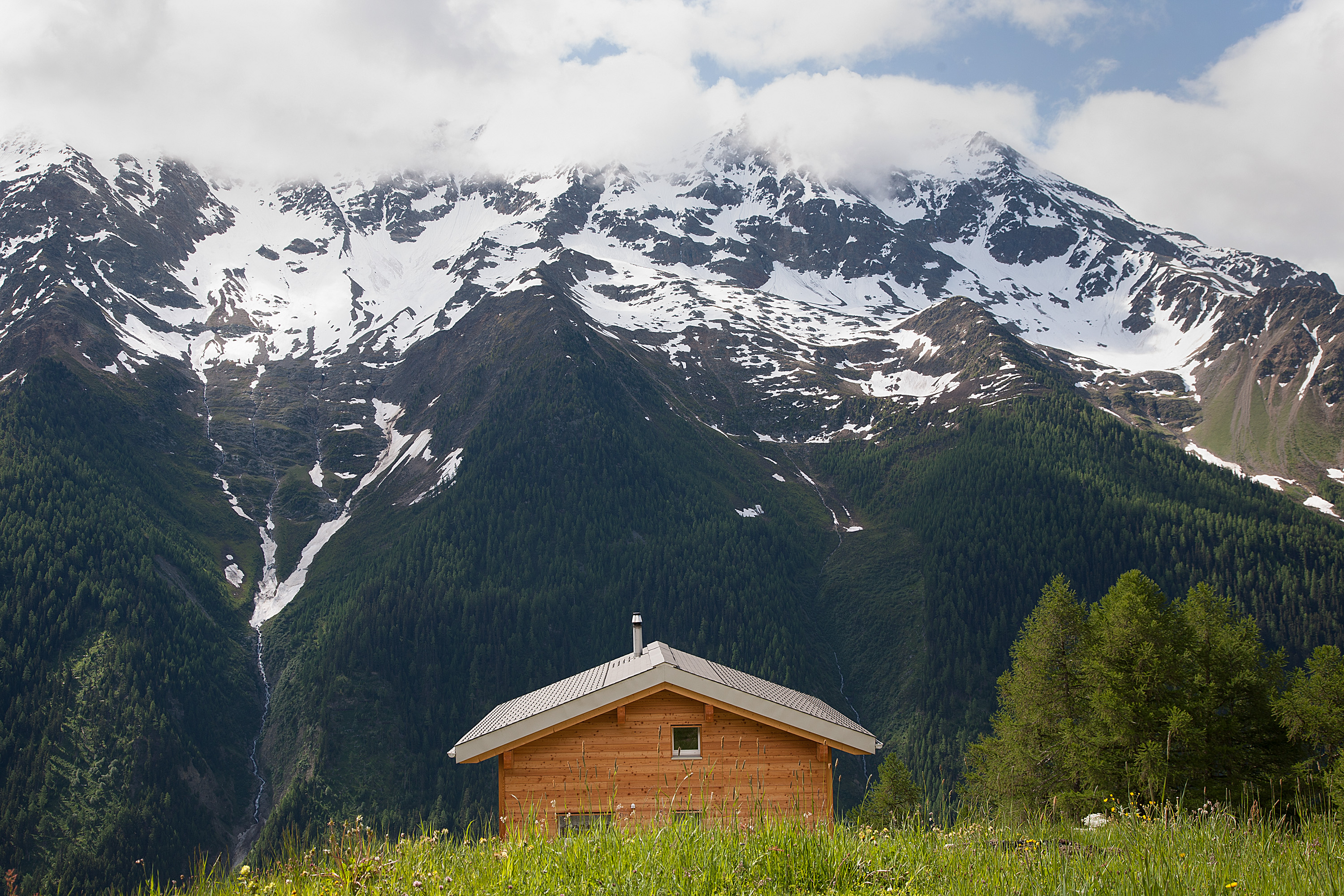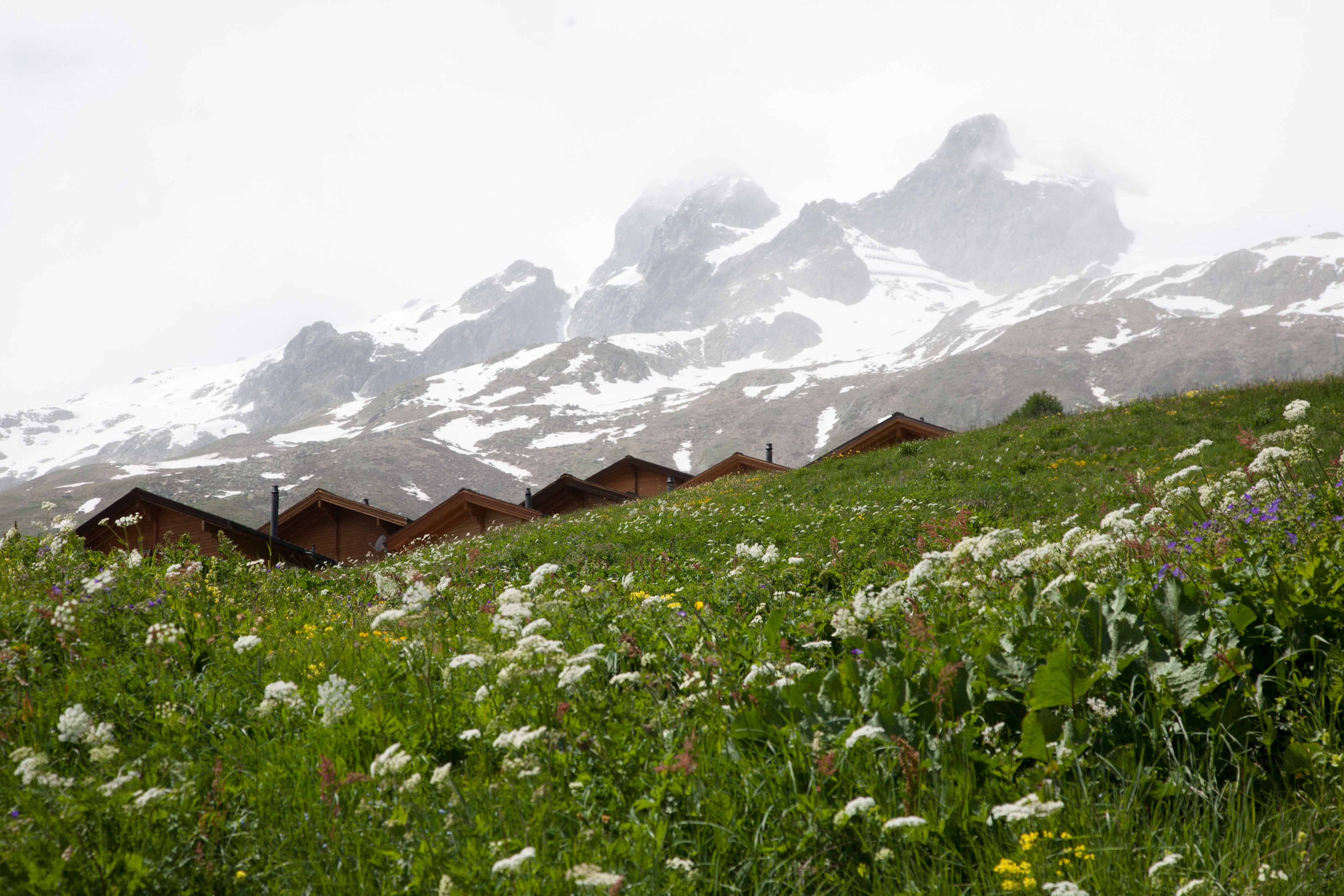
Silence and anger in the Alps

A controversial nationwide vote in 2012 imposing restrictions on the number of holiday homes has curbed construction work in many mountain tourist regions. But it is not all doom and gloom as swissinfo.ch discovers on a visit to Lauchernalp.
Situated at nearly 2,000 metres’ altitude in the Lötschental valley in south-western Switzerland the site is accessible only via cable car or on foot in winter. The small mountain road is also closed for private traffic in summer, and guests need a special permit from the local authorities to drive up to their holiday homes.
It is a quiet day on the sunny alp at the end of June. A lorry is about to leave a building site towards the valley below. Two electricians walk off in a hurry to get into their company car. No time apparently to talk to this reporter.
This time of the year there is only one crane to be found on the alp compared with the five or six building sites in previous years. Is this a result of a decision by Swiss voters in March last year to set a 20 per cent quota for holiday homes at a local level across the country?
Fifty years ago Lauchernalp consisted of a few stables and barns for the cattle and the herdsmen scattered across the territory. Nowadays there are about 200 chalets, a complex with holiday apartments, a hotel, a couple of restaurants and the cable car installations.

More
Building activity stalled in holiday village
Economic factor
Hans-Jakob Rieder, local mayor and owner of a company providing sanitary fittings, heating and roofing services, is disappointed by the ballot box verdict, but refuses any further comment.
His namesake Beat Rieder is more talkative. The president of a valley council – a local body dealing with broader political issues – says the slack business activity for the building trade is the result of the many open legal questions following the vote.
“There is a complete absence of legal security in this sector,” he says.
It is a matter of life and death for some regions in the area. “We’ll see how many jobs will disappear and how the local businesses can continue to exist,” he adds.
Holiday homes and the cable cars are the lifeline for Lauchernalp and the local economy of the region according to Rieder.
The entire Lötschental almost exclusively depends on the revenue from winter tourism, notably on Lauchernalp as most of the area is a protected environment.
“Most of the development land is in the hands of local families who are sensitive to using the property economically,” Rieder says. No wonder that some people in the area are downright angry with the outcome of the controversial vote.
Disproportionate infrastructure
Having said that, the Lötschental’s holiday homes-based business concept has had its fair share of opponents, notably among tourists and guests, says Karl Meyer. He has lived all his life in the valley, owns a chalet on Lauchernalp and runs an estate agency.
As for the local population, nine out ten voters came out against the introduction of building restrictions at the ballot box in 2012.
Chalets once built and not rented out regularly contribute little to the local economy, according to Meyer who also represents a local pressure group.
“The owners might get themselves a season ticket for the cable cars and occasionally buy local produce. But they bring their tinned or deep frozen food from the supermarket at home,” says Meyer. “Some of the guests come one or two weeks at the most and of course for the Christmas holidays, our peak season.”
This has led to an infrastructure on Lauchernalp which – apart from a few days every year – has grown out of proportion and is not used.
An enormous effort is needed from the local authorities for the water supplies alone since water is needed to prepare the pistes with freshly produced snow.
“Not forgetting the construction and maintenance of the wastewater treatment system, electricity provision, roads, hiking tracks and parking facilities,” says Meyer.
The initiative by the Helvetia Nostra environment group was approved by Swiss voters in March 2012.
Holiday homes may only account for a maximum of 20% of the overall housing stock in a commune.
The result of the vote was a considered an upset and a serious setback for the building industry in tourist regions.
The government recently proposed a number of exceptions to circumvent the restrictions stipulated in the constitutional amendment.
The plan foresees the construction of holiday homes despite the 20% limit. The new accommodation must be managed as a hotel venture, be part of a condominium ownership system or in the case of holiday apartments built in the homes of local residents, provide an additional source of income.
Empty homes
The noticeable quiet in the holiday resort is not only the result of the decline in the construction industry. It is also due to an absence of guests. Many chalet owners are loath to rent out their abodes. Therefore the homes are empty most of the year – a situation which prompted political moves to rein in the building industry in tourist regions.
Among the few tourists around are a couple of retirees whose chalet sits on a ridge a little outside the holiday village in Lauchernalp. The Schneiders say they have spent their summer holidays here for the past 45 years. They live outside Zurich and sometimes come to live on Lauchernalp for up to three months.
They welcome the efforts by the local authorities to protect the environment as well as the local zoning laws. But they equally benefit from the modern infrastructure in the holiday village which brings the amenities necessary for people of their generation.
Another chalet owner is mowing the grass on the lavish property. She does not rent the home out as she comes to Lauchernalp from eastern Switzerland once a month on average and for a couple of days.
The question where she stands on the issue of construction restrictions seems to have caused some difficulty for her.
She says she rejected the initiative even though she risks losing the great view from her chalet if the owners of the neighbouring site decide to have another chalet built.
“How could I agree to a cap on holiday homes being a chalet owner myself?” she asks.
Enough’s enough
But not everyone agrees. Mr and Mrs Hafner from the region of Bern sit on the balcony of their chalet after having done their gardening chores. They enjoy an excellent view of the Bietschorn mountain, a white peak almost 4,000 metres high in the nearby World Heritage reserve.
They both approved the proposal for caps on holiday homes. “Because enough is enough.”
The couple, their children and grandchildren use the chalet up to six months a year, they say.
When the Hafner family bought the home nearly three decades ago there was neither electricity nor a tarmac road at Lauchernalp. And barely more than a dozen neighbours, they add with an air of wistfulness.
Over the years the holiday homes have mushroomed.
“Now, in winter the place feels like a village. But it seems dead during the off-season,” the Hafners say.
Critics say the traditional system of holiday homes has a poor economic impact at the expense of taxpayers who have to foot the bill for the public infrastructure.
Christophe Clivaz, a professor of the Sion-based Graduate Institute Kurt Bösch, says studies show the building industry is creating a higher revenue than the tourist sector in some areas in Canton Valais – a major tourist region in Switzerland.
Accommodation for 40,000 tourists in the Crans-Montana resort generate an annual income of only about CHF20 million ($20.7 million) for cable cars operators. Some 2,000 of these holiday homes lie empty all year round.
Clivaz says the 20% cap on new holiday homes is a serious threat for the construction industry, but less so for tourism.
He sees business potential for companies active in renovation and improved energy efficiency.
(Adapted from German by Urs Geiser)

In compliance with the JTI standards
More: SWI swissinfo.ch certified by the Journalism Trust Initiative



























You can find an overview of ongoing debates with our journalists here . Please join us!
If you want to start a conversation about a topic raised in this article or want to report factual errors, email us at english@swissinfo.ch.